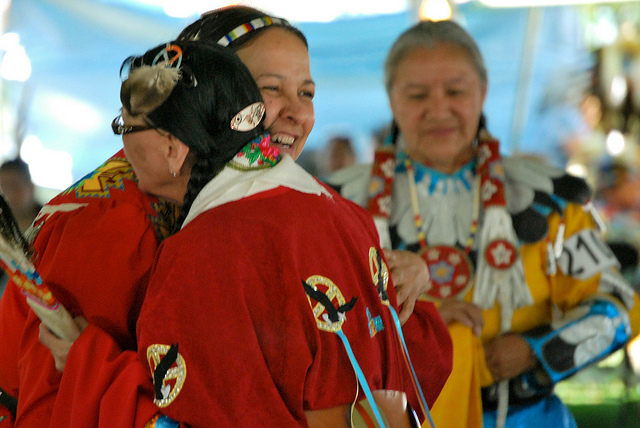I remember the first time I heard the Women’s Warrior Song. I remember the first time I heard what the drums sound like on the West Coast. I remember the time I was in a crowd of passionate people fighting for the same cause.
I remember the deep feeling of dread when I saw the police pull up. I remember the strong women — little kokums, aunties, and fierce youth — that took to the front lines with drums and song in the face of the strong arm of the state.
I remember drum beats and sage. I remember immense love.
For me, this is where political protest and activism are centered: within this space of Indigenous resistance, Indigenous love, and solidarity. But solidarity has become this thing that is widely talked about yet rarely practiced. What does solidarity even mean within these activist spaces that we enter? What does solidarity mean within Indigenous activism?
As Anishinaabe scholar Leanne Simpson discusses when she explains what traditional diplomacy looks like from her perspective as an Indigenous woman, the answers to these questions rely on the ability to situate oneself within a larger discussion of Indigenous nationhood:
“According to my own traditions, I would have a responsibility to listen, to learn, and to appreciate the jurisdiction, political culture, and traditions of the nation within which I was residing. I would have a responsibility to understand the issues this nation was facing, and I would have an obligation to support them and to stand with them. I would have a sacred duty to learn about my place and role within their political structure and their culture.”
Like Simpson explains, we are all obligated to stand with and support the Nations we are visitors in. It is our obligation to stand in solidarity, to learn our place and the roles we can play within the framework of the lands we are visiting. Now, I think it’s important to make it explicitly clear, I am not talking about Canada… I’m talking about the Indigenous Nations whose land we are calling home right now. Think of the land beneath your feet and think about whose land that is. Now think of your duty to help the caretakers of this land. That is solidarity.
Solidarity is learning when it is your place to stand up and shout or sit down and listen. Solidarity is not photoshoot opportunities, solidarity is not the selfish need to prove yourself, because solidarity is not about you.
All these struggles we fight against — environmental destruction, capitalism, violence against women — these are all Indigenous struggles and are all symptoms of violent colonization. Non-Indigenous folks need to stand in solidarity. Indigenous folks who are not of the land they are currently calling home, we need to stand in solidarity with peoples of the Nations we are visiting.
We all have work to do. We all have a responsibility to this land and a responsibility to each other. As Cherokee scholar Jeff Corntassel explains:
“Indigenous nations claim their own in a much different way: as relations with inherent responsibilities to our homelands, cultures, and communities. A Cherokee word that describes these lived relationships is digadatsele’i or ‘we belong to each other.’ It is this sense of belonging that breaks through the colonial confines of the “nuclear family” and guides our relational responsibilities.”
At the end of the day we all are fighting for a common goal and it is our duty to do so with love and respect for where we are and who we are.
This is how we all can exist together in a good way.
Image: Flickr/xiaozhuli



